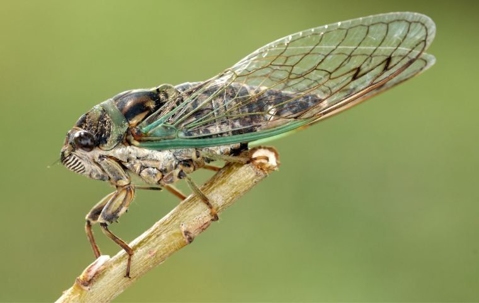Cicadas are a type of insect that belong to the order Hemiptera and the suborder Auchenorrhyncha. They are well-known for their distinct and loud buzzing sounds that they produce, especially during their mating rituals. Cicadas have a fascinating life cycle that involves spending most of their lives underground as nymphs before emerging as adults.
To address the question of whether cicadas bite, it's important to distinguish between different species and life stages of cicadas.
- Adult Cicadas: Adult cicadas, also known as imagoes, primarily feed on plant sap using their specialized mouthparts called stylets. These stylets are designed for piercing and sucking fluids from plants, such as tree sap. Unlike mosquitoes or other biting insects, cicadas do not have mouthparts designed for biting humans or animals. Therefore, adult cicadas do not typically bite humans. Their feeding behavior is focused on extracting nutrients from plants.
- Nymphs: Cicadas have a nymph stage that occurs underground. During this stage, they feed on the sap from plant roots. The nymphs have specialized mouthparts similar to those of the adult cicadas, which are adapted for piercing and sucking. However, their focus is on plant roots, and they do not have the anatomy or inclination to bite humans or animals.
- Defensive Behavior: While cicadas do not bite in the traditional sense, they can exhibit some defensive behaviors if they feel threatened. When handled or disturbed, they may flick their wings, produce loud sounds, or try to escape. These behaviors are meant to deter potential predators rather than to bite.
Cicadas are not considered biting insects. Their feeding habits are centered around extracting plant sap, and they lack the anatomical adaptations for biting humans or animals. However, it's worth noting that their defensive behaviors might lead to accidental interactions that some people could interpret as a "bite," even though it's not a true bite in the sense of actively piercing and injecting substances.
If you encounter cicadas, it's generally best to observe them from a respectful distance and avoid handling them unnecessarily. This not only protects the insects but also prevents any unintended interactions that might lead to discomfort for both the cicada and yourself.
If you find yourself bothered by cicadas, there are several steps you can take to manage the situation while being respectful of the insects' natural behavior. Here's a comprehensive guide on what to do if cicadas are bothering you:
- Stay Calm: First and foremost, remember that cicadas are harmless to humans. They do not bite or sting, and their primary focus is on their own natural activities. Keeping a calm demeanor can help you avoid unnecessary panic.
- Close Windows and Doors: If the noise of cicadas is bothering you indoors, consider closing windows and doors to reduce the sound. You can also use heavy curtains or blinds to further dampen the noise if needed.
- Use White Noise: Playing white noise or soothing music in the background can help mask the sound of cicadas and create a more pleasant atmosphere indoors.
- Limit Outdoor Activities: If cicada noises are particularly bothersome in your area, you might choose to limit outdoor activities during peak cicada emergence times. Cicadas are most active during the day, so adjusting your outdoor plans to early morning or evening hours might help.
- Wear Ear Protection: If you need to be outdoors and find the cicada noise disruptive, consider wearing ear protection such as earmuffs or earplugs. This can help reduce the noise while allowing you to continue with your activities.
- Maintain Landscaping: Cicadas are attracted to trees and shrubs, as they lay their eggs in the branches. If you have trees or plants close to your home, regularly pruning them and maintaining the landscaping can help reduce the presence of cicadas in your immediate vicinity.
- Learn and Appreciate: Taking the time to learn about the natural phenomenon of cicada emergence can foster an appreciation for the cycles of nature. Cicadas have unique life cycles that can be fascinating to observe and study.
- Temporary Solutions: If you're hosting an outdoor event or gathering, you could consider using temporary screens or netting to create a more peaceful environment. This can help keep cicadas away from the immediate vicinity.
- Patience: Remember that cicada emergences are relatively short-lived, usually lasting a few weeks to a couple of months, depending on the species. Being patient and understanding that this is a natural event can make the experience more manageable.
Dealing with cicadas involves finding a balance between minimizing their impact on your comfort while respecting their important role in the ecosystem. By taking a calm and respectful approach, you can coexist with these insects during their emergence periods.

